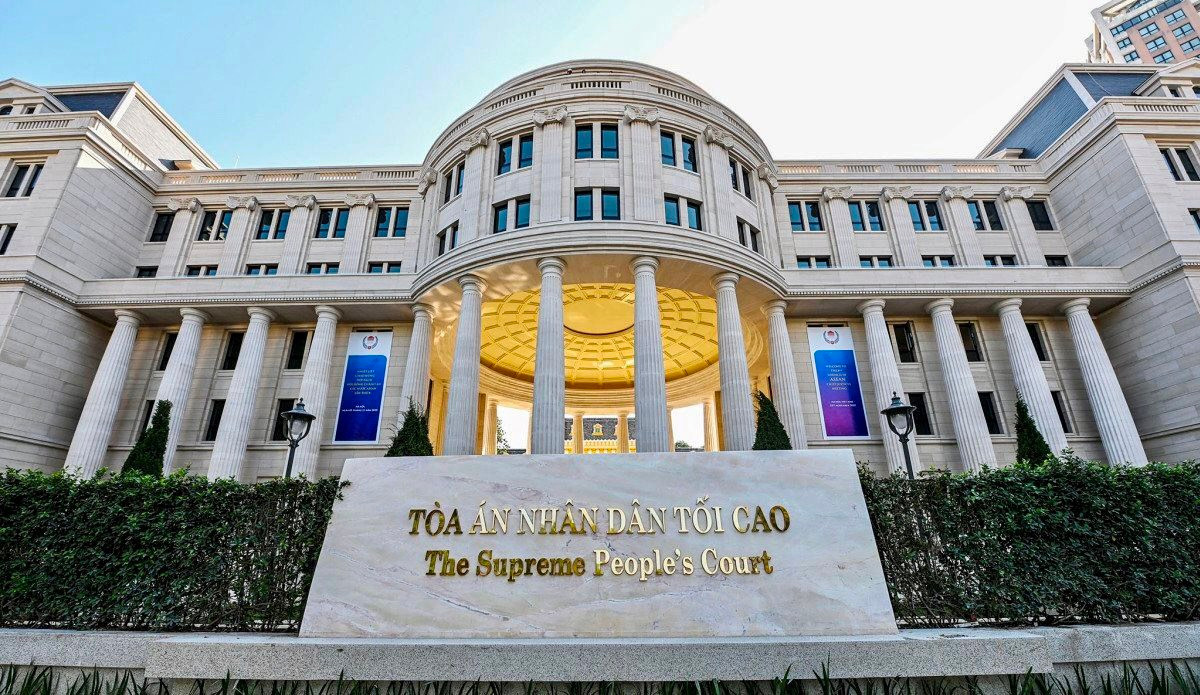Principles of organization and operation of the People's Court in Vietnam
Law on Organization of the People's Courts takes effect in Vietnam from January 01, 2025, including provisions on principles of organization and operation of the People's Courts.

Principles of organization and operation of the People's Court in Vietnam (Image from the internet)
1. Principles of organization and operation of the People's Court in Vietnam
The principles of organization and operation of the People's Court in Vietnam are stipulated in Article 5 of the Law on Organization of the People's Court 2024 as follows:
- Independence according to adjudicative authority.
- Ensuring equality before the law and the court.
- Exercising judicial power promptly, fairly, openly, impartially, and objectively.
- The regime of first-instance and appellate trials is ensured.
- Implementing policies for first-instance trials with the participation of assessors, except for trials under summary procedures.- Judges, assessors adjudicate independently and only comply with the law.
- People's courts adjudicate collectively and decide by majority, except for trials under summary procedures.
- Ensuring arguments in adjudication.
- Ensuring the right of defense for defendants, the right to protect lawful rights and interests of victims, and litigants.
- Courts are under the supervision of the People, the National Assembly, the People's Council, the Vietnam Fatherland Front, and its member organizations.
2. Organization and authority to establish and dissolve People's Courts in Vietnam
- The organization of People's Courts includes:
+ The Supreme People's Court;
+ High-level People's Courts;
+ People's Courts of province and centrally affiliated cities;
+ District People's Courts, district-level towns, cities under provinces, cities under centrally affiliated cities;
+ Specialized First-Instance Administrative Courts, Specialized First-Instance Intellectual Property Courts, Specialized Bankruptcy Courts (hereinafter collectively referred to as Specialized First-Instance Courts);
+ Central Military Courts, Military Zone-level Military Courts and equivalents, Regional Military Courts (hereinafter collectively referred to as Military Courts).
- The authority to establish and dissolve High-level People's Courts; People's Courts of province and centrally affiliated cities; District People's Courts, district-level towns, cities under provinces, cities under central cities; Specialized First-Instance Courts and Military Courts is stipulated as follows:
+ The Standing Committee of the National Assembly decides the establishment, dissolution, and stipulates territorial jurisdiction of High-level People's Courts and Specialized First-Instance Courts; establishes and dissolves People's Courts of province and centrally affiliated cities, District People's Courts, district-level towns, cities under provinces, cities under central cities at the proposal of the Chief Justice of the Supreme People's Court;
+ The Standing Committee of the National Assembly decides the establishment, dissolution, and stipulates territorial jurisdiction of Military Zone-level Military Courts and equivalents, Regional Military Courts at the proposal of the Chief Justice of the Supreme People's Court after reaching agreement with the Minister of National Defense.
(Article 4 of the Law on Organization of the People's Court 2024)
3. Tasks and powers of the People's Court in Vietnam
- The People's Court exercises judicial power, including adjudicating, deciding on disputes, law violations, issues related to human rights, rights and obligations of agencies, organizations, individuals as prescribed by law; ensuring uniform application of the law in adjudication.- When exercising judicial power, the People's Court has the following duties and powers:
+ Adjudicating and resolving criminal cases, administrative cases, civil matters (including civil cases and civil matters), bankruptcy cases and other cases and matters as prescribed by law;
+ Resolving and adjudicating administrative violations as prescribed by law;
+ Deciding on issues related to human rights, rights and obligations of agencies, organizations, individuals as prescribed by law;
+ Detecting and making recommendations on the constitutionality and legality of normative legal documents in the adjudication and resolution of cases as prescribed by law;
+ Interpreting the application of the law in adjudication and resolution of cases;
+ Summarizing adjudication practices, ensuring the uniform application of the law in adjudication; developing case law;
+ Performing duties and powers related to judgment enforcement as prescribed by law;
+ Performing other duties and powers as prescribed by law in Vietnam.
(Article 3 of the Law on Organization of the People's Court 2024)
- Cases of land rent exemption and reduction under the latest regulations in Vietnam
- Economic infrastructure and social infrastructure system in Thu Duc City, Ho Chi Minh City
- Regulations on ordination with foreign elements in religious organizations in Vietnam
- Increase land compensation prices in Vietnam from January 1, 2026
- Determination of land compensation levels for damage during land requisition process in Vietnam
- Who is permitted to purchase social housing according to latest regulations in Vietnam?
-

- Number of deputy directors of departments in Vietnam ...
- 15:04, 05/03/2025
-

- Cases ineligible for pardon in Vietnam in 2025
- 14:43, 05/03/2025
-

- Decree 50/2025 amending Decree 151/2017 on the ...
- 12:00, 05/03/2025
-

- Circular 07/2025 amending Circular 02/2022 on ...
- 11:30, 05/03/2025
-

- Adjustment to the organizational structure of ...
- 10:34, 05/03/2025
-

- Notable new policies of Vietnam effective as of ...
- 16:26, 11/04/2025
-
.Medium.png)
- Notable documents of Vietnam in the previous week ...
- 16:21, 11/04/2025
-
.Medium.png)
- Notable documents of Vietnam in the previous week ...
- 16:11, 02/04/2025
-
.Medium.png)
- Notable new policies of Vietnam to be effective ...
- 16:04, 02/04/2025
-
.Medium.png)
- Notable new policies of Vietnam effective from ...
- 14:51, 21/03/2025

 Article table of contents
Article table of contents
